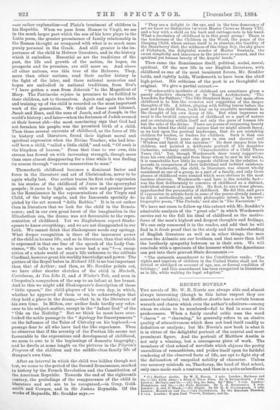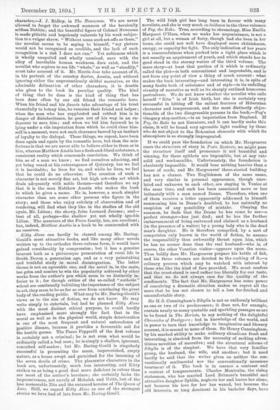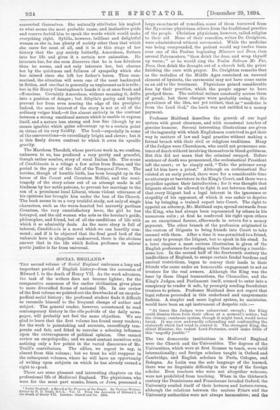RECENT NOVELS,* THE novels of Mr. W. E. Norris are
always able and almost always interesting (though in this latter respect they are somewhat variable); but Matthew Austin has a certain human warmth and charm which even the author's admirers—among whom we claim to be numbered—fail to find in some of its predecessors. When a fairly careful critic uses the word "charm" or "charming," he generally refers to an elusive quality of attractiveness which does not lend itself readily to definition or analysis ; but Mr. Norris's new book is what it is in virtue of the delightful portrait of the central and most prominent figure. And the portrait of Matthew Austin is not only a winning, but a courageous piece of work. The members of -that school of novelists which abjures the pretty unrealities of romanticism, and prides itself upon its faithful rendering of the observed facts of life, are apt to fight shy of the delineation of unspoiled nobility of character. 'Unless our memory misleads us, Thackeray, the head of that school, only once made such a venture, and then in a quite subordinate
• (1.) Matthew Austin. By W. E. Norris. 3 vols. London: Methuen and 0o.—(2.) Kitty A10710 a Story of Three Fires. By S. Baring-Gould. 3 vols. London Methuen and 0o.—(3.) Peg, the Rake. By Rita " 3 vols. London: Hutchinson and 0o.—(4.) Poste Restante. By (1. G. nargreaves. 3 vols. Leaden : A. and 0. Black.—05.) Sibytta. By Str H. S. Cuuniughtim. 2 vols. London, MeomUnu and Co.—(6.) Candiduccia. By the Wareham Taaoatai. 2 o:n. Loudon: Kegau Paul meareh, Traitor, and 00. character,-3. J. Ridley, in The Newcomes. We are never allowed to forget the awkward manners of the heroically selfless Dobbin; and the beautiful figure of Colonel Newcome is made pitiable and hopelessly unheroic by his weak subjec- tion to a vulgar shrew. "Without some such set-offs as these," the novelist seems to be saying to himself, "my picture would not be recognised as credible, and the lack of such recognition is a risk I dare not run." Yet nobleness which is wholly unspoiled and wholly unmixed, save with the alloy of inevitable human weakness, does exist, and the novelist who aspires to see life "whole," as well as "steadily," must take account of it. Mr. Norris does take account of it, in his portrait of the country doctor, Austin, and without ignoring either the unpretentiously skilful narrative, or the admirable delineation of other characters, it is Austin who gives to the book its peculiar quality. The kind of thing that he does is the kind of thing that has been done often by our old friend the romantic hero. When his friend and his fiancee take advantage of his trust shamefully to betray him, he remains their friend and helper; when the man who has supplanted and robbed him is in danger of disinheritance, he goes out of his way in an en. deavour to save him; and when we bid him farewell he is lying under a vile imputation from which he could clear him. self in a moment, were not such clearance barred by an instinct of loyalty to the disloyal. These things, we repeat, have been done again and again by the romantic hero, but then the mis- fortune is that we are never able to believe either in them or in him, whereas Matthew Austin has a flesh-and-blood substance, a consistent reality which commands conviction. We think of him as of a man we know ; we find ourselves admiring, and yet being vexed at his extravagance of Quixotry, but we feel it is inevitable; he lives for us, and while he lives, we feel that he could do no otherwise. The creation of such a character is not merely fine art, but high art—the art which deals adequately with noble themes—and therefore we say that it is the man Matthew Austin who makes the book to which he gives a name. He is, however, a much simpler character than are some other persons who figure in the story; and those who enjoy subtlety of observation and of rendering, will find what they like in the studies of the old cynic, Mr. Litton; the showy, false Leonard Jerome ; and— best of all, perhaps—the shallow yet not wholly ignoble Lilian. The members of the Frere family, too, are excellent; but, indeed, Matthew Austin is a book to be commended with no reserves.
Kitty Alone can hardly be classed among Mr. Baring- Gould's Most attractive books, and like many other novels written up to the orthodox three-volume form, it would have gained considerably by compression ; but it has a genuine interest both as a picturesque presentation of rural life in South Devon a generation ago, and as a very painstaking and truthful study in moral disintegration. The latter theme is not an agreeable one, and the novel is, in the main, too grim and sombre to win the popularity achieved by other works from the author's pen which seem to us distinctly in- ferior to it ; for though critics of the so-called " (esthetic " school are continually belittling the importance of the subject in art, they seem to be as far as ever from convincing the great body of the reading public. What may be Mr. Baring-Gould's views as to the aim of fiction, we do not know. He may write simply to entertain, but had he planned Kitty Alone with the most distinct ethical purpose, he could hardly have emphasised more strongly the fact that in the moral as well as in the physical world, simple deterioration is one of the most frequent and natural antecedents of positive disease, because it provides a favourable soil for the hostile germs. The Pasco Pepperill of the first volume is certainly not a criminal; he is not even what would be ordinarily called a bad man ; he is simply a shallow, ignorant, conceited self-seeker ; but Mr. Baring-Gould is singularly successful in presenting the mean, impoverished, empty nature, as a house swept and garnished for the incoming of the seven devils of crime. The pleasanter characters in the book are, unfortunately, much less interesting, and Kitty strikes us as being a good deal more deficient in colour than are most of the author's heroines ; she certainly lacks the impressiveness, not merely of Mehalah and Uritb, but of the less memorable Zita and the untamed heroine of The Queen of Love. Still, we regard Kitty Alone as one of the strongest stories we have had of late from Mr. Baring-Gould.
The wild Irish girl has long been in favour with many novelists, and she is very much en evidence in the three volumes of Peg, the R%ke. True, according to chronology, Miss Emilia Margaret O'Hara, when we make her acquaintance, is not a girl at all, but a woman of forty, though had she been in her teens, she could not well have displayed more skittishness, energy, or capacity for fight. The only indication of her years is a resourcefulness when pushed into a tight place which is not usually an acquirement of youth, and which stands her in good stead in the stormy waters of the third -volume. The mere story—at least that portion of it which is ordinarily called the plot—is both conventional and improbable, and is not from any point of view a thing of much account : what makes the book interesting—and interesting it is, in spite of many faults both of substance and of style—is its unfailing vivacity of narrative as well as its sharply outlined humorous portraiture. We do not know whether the novelist who calls herself " Rita " is of Irish birth, but she is certainly very successful in hitting off the salient features of Hibernian character and temperament, and the most distinctly objec- tionable of the two disagreeable persons in the book,—Peg's vinegary step-mother,—is an importation from England. If Peg, the Rake be not literature, and it can hardly make thia claim, it will be found very agreeable light reading by those who do not object to the Bohemian elements with which its atmosphere is so strongly impregnated.
If we could pass the foundation on which Mr. Hargreaves rears the structure of story in Poste Restante, we might pass the structure itself and pronounce it not beautiful and winning, for these epithets are impossible, but at any rate solid and workmanlike. Unfortunately, the foundation is absolutely impossible. It would bear nothing heavier than a house of cards, and Mr. Hargreaves' three-storied building has not a chance. Two Englishmen of the same name, and very similar in personal appearance, though unre- lated and unknown to each other, are staying in Venice at the same time, and each has been associated more or less intimately with a man named Deane. Therefore, when one of them receives a letter apparently addressed to himself, summoning him to Deane's deathbed, he has naturally no suspicion of any possibility of mistake. Obeying the summon, he finds that the Deane he has come to see—a perfect stranger—has just died; and he has the further embarrassment of being embraced and claimed as a husband (in the presence of a waiter) by a young lady who is the dead man's daughter. He is therefore compelled, by a sort of compulsion only known in the world of fiction, to assume the responsibility thus awkwardly thrust upon him, which he has no sooner done than the real husband—who is, of course, the other Venetian visitor—appears upon the scene. Thus boldly does Mr. Hargreaves prepare his kettle of fish, and his three volumes are devoted to the cooking of it,—a culinary process which may be watched with interest by those who like the kind of fare provided. We must confess that the cruet-stand is used rather too liberally for our taste, and that we do not always care for the quality of the condiments. The fact that Mr. Hargreaves has some power of conceiving a dramatic situation makes us regret all the more that he has not chosen to tell a less far-fetched and uncomfortable story.
Sir H. S. Cunningham's Sibylla is not so uniformly brilliant as one or two of its predecessors; it does not, for example, contain nearly so many quotable and sparkling passages as are to be found in The Heriots, to say nothing of the delightful Chronicles of Dustypore ; but in knowledge of the world, and in power to turn that knowledge to imaginative and literary account, it is second to none of them. Sir Henry Cunningham, by his marked ability to make ordinary situations fresh and interesting, is absolved from the necessity of seeking adven- titious novelties of narrative ; and the structural scheme of Sib ylla is of the simplest. We have that very familiar group, the husband, the wife, and another; but it need hardly be said that the writer gives us neither the con- ventionally sentimental nor the conventionally nauseous treatment of it. The book is in essence a contrast and a contest of temperaments. Charles Montcalm, the rising statesman, who has married Lord Belmore's beautiful and attractive daughter Sybilla, neglects her and leaves her alone, not because his love for her has waned, but because the old interests, so long dominant in his bachelor days, have
reasserted themselves. She naturally attributes his neglect to what seems the most probable cause, and instinctive pride and reserve forbid him to speak the words which would make everything right. Sybilla, however, brilliant and delightful woman as she is, has plenty of society other than that which she cares for most of all, and it is at this stage of her history that the gay society butterfly, Amershaus, flutters into her life and gives it a certain new animation. He interests her, for she soon discovers that he is less frivolous .than he seems, and not only interests her, but charms her by the quickness and fullness of sympathy which she has missed since she left her father's house. Thus sum- marised, the situation will seem one of the most hackneyed in fiction, and one that is generally as unpleasant as it is trite ; but in Sir Henry Cunningham's hands it is at once fresh and offanceless. Certainly Amersham, without meaning it, drifts into a position of danger ; but Sibylla's purity and loyalty prevent her from even nearing the edge of the precipice. Indeed, the main interest of the story is not at all of the ordinary vulgar kind,—it lies almost entirely in the contrast between a strong emotional nature which is unable to express itself, and a nature less strong and less fine (though by no means ignoble) which gains advantage up to a certain point in virtue of its very fluidity. The book—especially in some of the conversations—is exceedingly bright and clever ; but it is this finely drawn contrast to which it owes its specific gravity.
The Marchese, Theodoli, whose previous work is, we confess, unknown to us, has produced a very pretty and graceful, theugh rather sombre, story of rural Italian life. The scene of Candiduccia is a village a few miles from Rome, and the period is the year of the fall of the Temporal Power. The heroine, though of humble birth, has been brought up in the house of the Count and Countess Mellini, and the semi- tragedy of the story arises out of an attempt made in all kindness by her noble patrons, to prevent her marriage to the son of a prominent local Liberal, whose violent utterance of his opinions has brought him under the ban of the Church. The book seems to us a very truthful study, not only of single characters, such as the warm-hearted but narrowly partisan Countess, the very unsatisfactory lover, the girl he has betrayed, and the old woman who acts as the heroine's guide, philosopher, and friend, but of all the conditions of life with which it so admirably deals. As the mere story is full of interest, Candiduccia is a novel which we can heartily com- mend; and if it be objected that the final good luck of the unheroic hero is altogether undeserved, there is the obvious answer that in the life which fiction professes to mirror poetic justice is far from universal.




































 Previous page
Previous page